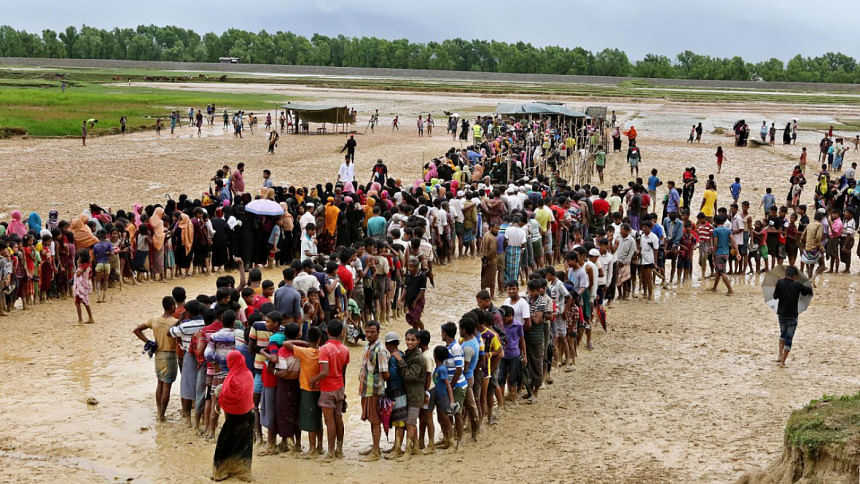Bearing the economic cost of the Rohingya crisis

Bangladesh has been taking in Rohingya refugees from Myanmar since the 70s, right after independence, and the rate accelerated in the 1990s. Currently, we are sheltering, feeding, and providing various assistance to well over a million refugees and it is possible that the situation might get worse before it gets better.
The current crisis in South Asia is at par with the Middle Eastern refugee crisis that erupted in Europe in 2015. Who could have imagined that Bangladesh, which is trying to lift itself up by its bootstraps and does not have either the resources or the backing of rich neighbours that Greece, Italy and Turkey had, would so willingly take upon this Herculean responsibility?
However, we did, and while the cost to our not-so-rich country is mounting every day, we have put up a good fight to meet the demands of the situation as well as to raise the issue in international forums. It is also time to ask the international agencies and G20 nations to assume a fair share of the financial burden to resolve the humanitarian crisis.
The restraint exercised by the government of Bangladesh is laudable. As is known, international observers have backed us on many issues. The UN Human Rights Office said in a new report two weeks ago that the attacks by the Myanmar army against Rohingyas in northern Rakhine state were "well-organised, coordinated and systematic, with the intent of not only driving the population out of Myanmar but preventing them from returning to their homes by instilling deep and widespread fear and physical, emotional, and psychological trauma among them."
There are multidimensional aspects of the current crisis, and the magnitude of the challenges is huge. There are undoubtedly economic losses for residents of the densely populated areas along the Naf River in Cox's Bazar. Rohingyas settled in Teknaf and Ukhia upazilas, who now number over 600,000, are costing us more than USD 4 million daily to feed and shelter, not counting the other half a million who came earlier. We have come across reports that there has been a 70 percent drop in commerce between Bangladesh and Myanmar since the latest round of Myanmarese military operations. Communities in the Cox's Bazar region have witnessed visible signs of turmoil in their economic life, and any additional influx may even totally disrupt the daily activities of the residents. Harvesting, fishing activities, border trade, service, and daily commerce could come to a standstill. Prices of essential commodities are likely to go up considerably and that will bring hardship for the average family whose livelihood depends on a semblance of normalcy in the ecosystem.
The current situation has already cost us both directly and indirectly. Among the indirect or imputed costs, we should include the following: infrastructure, government services including security, natural resources, health and sanitation, and the labour market. According to some accounts, the tourism industry in Cox's Bazar has taken a hit.
It is to be noted, however, that there are some countervailing benefits resulting from the crisis. Some sectors of the economy, particularly the hospitality and airline industry, have witnessed a surge in demand from journalists, international observers, and human rights activists who are flocking to the Cox's Bazar region to report on the crisis, observe firsthand the condition of the refugees, and to offer assistance to the needy.
Last week, the UN pledging conference sought a total of USD 434 million response plan to help 1.2 million Rohingyas and the Bangladeshi host community. The UN Under-Secretary-General for Humanitarian Affairs and Emergency Relief Coordinator, Mark Lowcock, told delegates on that day that focus would be on mobilising resources "to save lives and protect people". Bangladesh can legitimately expect at least USD 1 billion per annum to provide services to these refugees, and this amount would still be negligible compared to USD 5 billion that the European countries promised Turkey in the wake of the Middle Eastern crisis.
All said and done, resumption of dialogue with Myanmar to facilitate the return of the Rohingyas to their homeland comes at a momentous time. The MoU signed by the two governments and the fact that the Myanmar authorities informed the Bangladesh home minister regarding the formation of a joint working group by November 30—a promise made by the Myanmar government on repatriation of the Rohingyas—are optimistic signs for Bangladesh, the Rohingya Diaspora, and the international community.
Dr Abdullah Shibli is an economist and Senior Research Fellow at International Sustainable Development Institute (ISDI), a think tank based in Boston, USA.










Comments